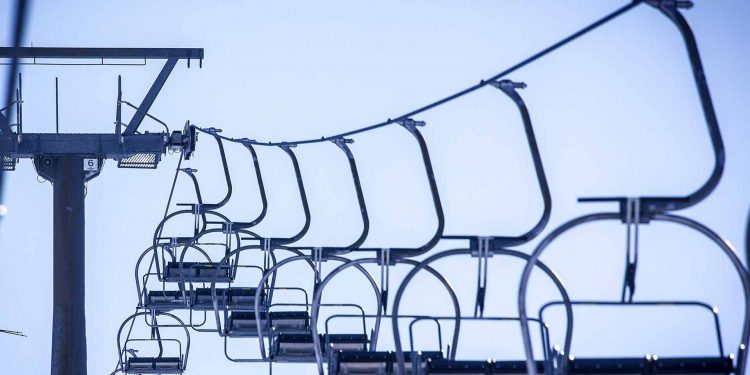EU sends money to ski lifts operators for the damages suffered due to the restrictive measures introduced by the government to limit the spread of the Coronavirus. The European Commission has approved, under EU State aid rules, a French scheme with a budget between €140 and €700 million.
Executive Vice-President Margrethe Vestager, in charge of competition policy, said: “The continued waves of the coronavirus outbreak have brought ski lifts on standby throughout the winter season, triggering significant losses for their operators and ski resorts overall. This scheme will enable France to compensate ski lift operators for the damages suffered due to restrictive measures taken to contain the coronavirus. We continue to work closely with Member States to find effective solutions to support companies in these difficult times, in line with EU rules.”
The French scheme is designed to compensate ski lift companies, operating in winter sport resorts, for the turnover loss suffered as a result of the governmental restrictions necessary to limit the spread of the coronavirus that ban access of the general public to these ski lifts.
Direct grants for season damages
Under the scheme, ski lift operators will be entitled to compensation in the form of direct grants for damages incurred between 1 December 2020 and 30 April 2021 or the end date of the governmental restrictions affecting ski lifts, whichever is the earliest. The end date of the eligible period will depend on a possible extension of the governmental restrictions currently in place, but cannot in any case run after end-April 2021. The grants will cover up to 49% of the estimated turnover loss. The French authorities will also verify that there will be no overcompensation on the basis of the net losses incurred because of the pandemic. France will thus ensure that no individual beneficiary receives more in compensation than it suffered in damages and that any payment in excess of the actual damage is recovered.
The Commission assessed the measure under Article 107(2)(b) of the Treaty on the Functioning of the European Union (TFEU), which enables the Commission to approve State aid measures granted by Member States to compensate specific companies or sectors (in the form of schemes) for damage directly caused by exceptional occurrences.
The Commission considers that the coronavirus outbreak qualifies as such an exceptional occurrence, as it is an extraordinary, unforeseeable event having a significant economic impact. As a result, exceptional interventions by the Member States to compensate for the damages directly linked to the outbreak are justified.
The Commission found that the French aid scheme will compensate damages that are directly linked to the coronavirus outbreak. It also found that the measure is proportionate, as the envisaged compensation does not exceed what is necessary to make good the damage.
The Commission therefore concluded that the scheme is in line with EU State aid rules.
OECD: Faster vaccine rollout is critical to stronger recovery

Public financial support given directly to citizens
Financial support from EU or national funds granted to health services or other public services to tackle the coronavirus situation falls outside the scope of State aid control. The same applies to any public financial support given directly to citizens. Similarly, public support measures that are available to all companies such as for example wage subsidies and suspension of payments of corporate and value added taxes or social contributions do not fall under State aid control and do not require the Commission’s approval under EU State aid rules. In all these cases, Member States can act immediately. When State aid rules are applicable, Member States can design ample aid measures to support specific companies or sectors suffering from the consequences of the coronavirus outbreak in line with the existing EU State aid framework.
On 13 March 2020, the Commission adopted a Communication on a Coordinated economic response to the COVID-19 outbreak setting out these possibilities.
In this respect, for example:
- Member States can compensate specific companies or specific sectors (in the form of schemes) for the damage suffered due and directly caused by exceptional occurrences, such as those caused by the coronavirus outbreak. Article 107(2)(b)TFEU covers this condition.
- State aid rules based on Article 107(3)(c) TFEU enable Member States to help companies cope with liquidity shortages and needing urgent rescue aid.
- This gets support by a variety of additional measures, such as under the de minimis Regulation and the General Block Exemption Regulation, which can also be put in place by Member States immediately, without involvement of the Commission.
In case of particularly severe economic situations, such as the one currently faced by all Member States due the coronavirus outbreak, EU State aid rules allow Member States to grant support to remedy a serious disturbance to their economy. You can find this in Article 107(3)(b) TFEU of the Treaty on the Functioning of the European Union.
US Biden plan stimulus for Recovery will impact EURO area

EU State aid rules for Ski Lifts
On 19 March 2020, the Commission adopted a State aid Temporary Framework based on Article 107(3)(b) TFEU to enable Member States to use the full flexibility foreseen under State aid rules to support the economy in the context of the coronavirus outbreak.
Temporary Framework for Support
The Temporary Framework, as amended on 3 April, 8 May, 29 June, 13 October 2020 and 28 January 2021, provides for the following types of aid, which can be granted by Member States:
- (i) Direct grants, equity injections, selective tax advantages and advance payments;
- (ii) State guarantees for loans taken by companies;
- (iii) Subsidised public loans to companies, including subordinated loans;
- (iv) Safeguards for banks that channel State aid to the real economy;
- (v) Public short-term export credit insurance;
- (vi) Support for coronavirus related research and development (R&D);
- (vii) Support for the construction and upscaling of testing facilities;
- (viii) Support for the production of products relevant to tackle the coronavirus outbreak;
- (ix) Targeted support in the form of deferral of tax payments and/or suspensions of social security contributions;
- (x) Targeted support in the form of wage subsidies for employees;
- (xi) Targeted support in the form of equity and/or hybrid capital instruments;
- (xii) Support for uncovered fixed costs for companies facing a decline in turnover in the context of the coronavirus outbreak.
Ski lifts EU Grants until the end of December 2021
The Temporary Framework will be in place until the end of December 2021. With a view to ensuring legal certainty, the Commission will assess before this date if it needs to be extended. The non-confidential version of the decision will be made available under the case number SA.60949 in the State aid register on the Commission’s competition website once any confidentiality issues have been resolved.















